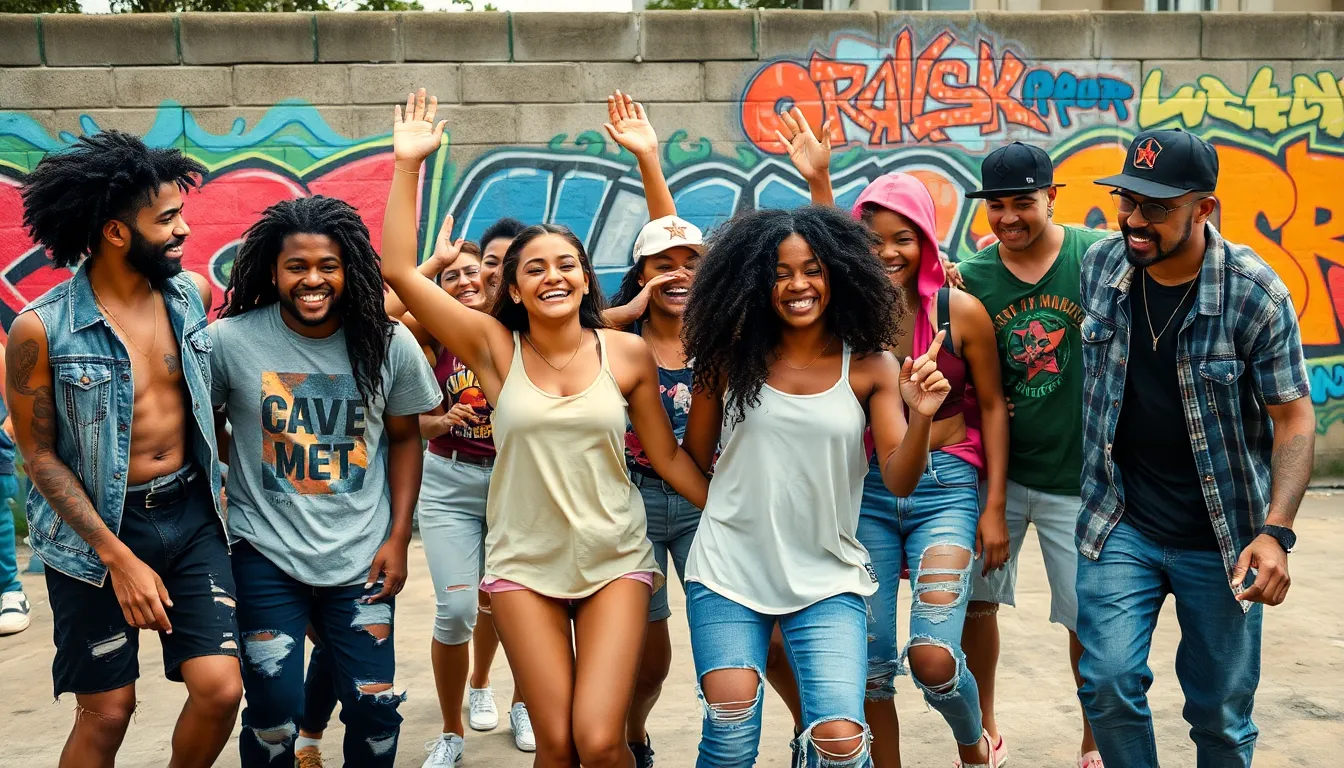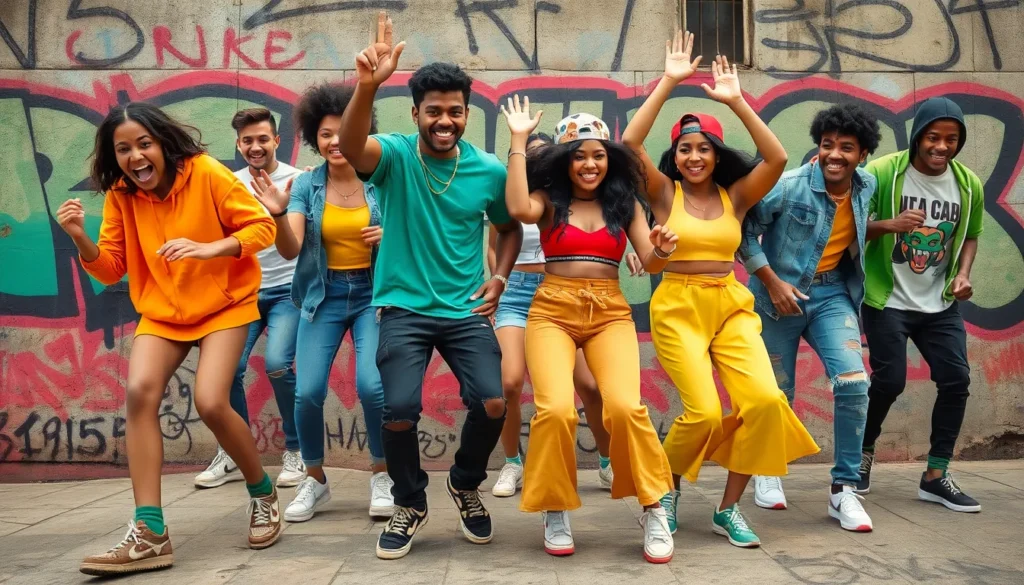Table of Contents
ToggleHip-hop isn’t just a genre; it’s a vibrant culture that pulses through the veins of society. From its catchy beats to its powerful lyrics, hip-hop engages listeners in ways that few other art forms can. Whether it’s dancing in the streets or spitting rhymes in a cypher, this dynamic movement invites everyone to join the party.
Understanding Hip-Hop Engagement
Hip-hop engagement encompasses the active participation and connection individuals have with hip-hop culture. This phenomenon extends beyond music, allowing for creative expression and community building.
Definition and Scope
Hip-hop engagement refers to the interaction individuals have with hip-hop as a cultural movement. It includes participation in various activities, such as dance, art, and poetry. Engaging in these forms of expression fosters a sense of belonging among participants. People from diverse backgrounds contribute to its evolution, ensuring hip-hop remains dynamic. Its scope includes not only performance but also discussions about social issues addressed in hip-hop lyrics. The culture encourages collaboration, with artists and audiences sharing ideas and experiences, enriching the overall impact.
Historical Context
Hip-hop originated in the 1970s in the Bronx, New York City. It emerged as a response to social and economic challenges faced by marginalized communities. DJs began mixing tracks while MCs started rapping over these beats to convey their messages. Over the decades, hip-hop grew to reflect societal changes, incorporating themes of resistance and empowerment. It gained global recognition, attracting a wide audience across various demographics. The historical roots of hip-hop illustrate its role as a voice for the voiceless, a platform for creative freedom, and a catalyst for social awareness.
The Role of Hip-Hop in Society

Hip-hop plays a significant role in shaping societal norms and values. This vibrant culture influences various aspects of life, from fashion to language.
Cultural Impact
Cultural expressions in hip-hop resonate with diverse audiences. Music and dance unite individuals, amplifying voices that often go unheard. Popular artists frequently address historical events and social issues, enabling listeners to connect with their realities. Viewers encounter visual art forms like graffiti, reflecting community identity and struggles. Events such as hip-hop festivals celebrate creativity while promoting inclusiveness. Streets become canvases for self-expression, blending artistry with activism.
Social Movements
Social movements leverage hip-hop’s reach to advocate for change. Activism often finds a voice through powerful lyrics and messaging. The genre rallies support for equality and justice, addressing systemic issues faced by marginalized communities. Recent protests have seen artists using their platforms to inspire action and awareness. Grassroots campaigns gain momentum through the influential presence of hip-hop culture, mobilizing communities. Collectively, these efforts highlight the resilience and determination present in societal struggles, uniting individuals around common goals.
Methods of Engagement in Hip-Hop
Engagement in hip-hop takes various forms, with education and community involvement playing significant roles. Each method encourages participation and fosters a sense of belonging.
Education and Workshops
Education in hip-hop focuses on skill development and cultural understanding. Workshops often cover beat-making, rapping, and dance techniques, inviting individuals of all backgrounds to learn. Institutions and organizations frequently host these events, providing resources and expertise. Participants gain insights into hip-hop history and its socio-political context, enhancing appreciation for the culture. Connecting artists with students promotes mentorship opportunities, allowing for growth and collaboration within the hip-hop community.
Community Events
Community events create a vibrant atmosphere for connection and expression. Block parties and open-mic nights bring local talents together, encouraging audience participation. These gatherings often feature performances from emerging artists, reflecting the community’s identity and experiences. Festivals celebrate hip-hop culture, showcasing dance, art, and music while promoting inclusivity. Through collaboration with local organizations, these events galvanize support for social issues, empowering individuals to engage actively with their surroundings.
Challenges in Hip-Hop Engagement
Engaging with hip-hop culture involves navigating several challenges. Misrepresentation and accessibility issues stand out as significant barriers to connection.
Misrepresentation
Misrepresentation of hip-hop culture often leads to stereotypes and misconceptions. Mainstream media frequently distorts the genre, focusing on violence and materialism while ignoring its rich history and social commentary. Artists face difficulty in communicating authentic narratives due to these oversimplifications. Listeners may perceive hip-hop inaccurately, and this can diminish their appreciation for the art form. It’s vital to challenge these narratives through education and awareness, promoting a deeper understanding of the diverse voices within hip-hop. Conversations around representation foster a more inclusive environment, allowing individuals to connect meaningfully with the culture.
Accessibility Issues
Accessibility issues hinder widespread participation in hip-hop engagement. Financial barriers often prevent aspiring artists from accessing resources like instruments or production tools. Geographic limitations can further isolate communities from hip-hop events or workshops, restricting opportunities for learning and collaboration. Lack of awareness about local hip-hop initiatives also plays a role, making it challenging for individuals to connect with the culture. Enhancing access to educational programs, community events, and digital platforms can bridge these gaps. Efforts to increase outreach and resources encourage broader engagement, helping to foster a more vibrant and inclusive hip-hop community.
Hip-hop engagement stands as a powerful testament to the genre’s ability to unite individuals and foster community. It invites diverse participation and encourages creative expression while addressing pressing social issues. By embracing hip-hop culture, people not only connect with its rich history but also contribute to ongoing dialogues about identity and justice.
As the genre continues to evolve, enhancing accessibility and promoting authentic narratives will be crucial in ensuring that hip-hop remains a vibrant platform for change. Engaging with hip-hop offers an opportunity to celebrate creativity and resilience while building bridges across communities. Through active participation, individuals can harness the transformative power of hip-hop to inspire action and amplify voices that deserve to be heard.





